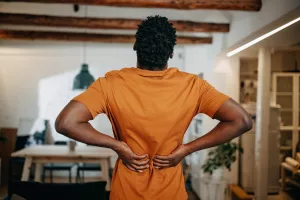A herniated disc happens when a soft part of the inner spine pushes through the tough outer layer. This puts pressure on the nearby nerves, which can lead to pain, numbness and weakness.
Is it a pulled muscle or herniated disc?
Your spinal discs are like shock absorbers. They provide a cushion in between the bones that make up your spine (vertebrae) and soak up the impact created by activities like jumping, lifting or even walking. A herniated disc occurs when that cushion ruptures.
Herniated discs and a pulled back muscle cause similar types of pain, but 1 major difference between the 2 injuries is numbness. If you lose feeling anywhere along the spinal column or if it feels a lot weaker than usual, it's likely that you're living with a herniated disc.
The good news is that herniated discs are very treatable and often go away with at-home remedies like rest and over-the-counter medication. But if your herniated disc pain persists or becomes too much to bear, we'll work together with you to get you on the road to recovery.

Testing
The most common way to diagnose a herniated disc is with a physical examination. Your doctor will follow up with an MRI to get a better look at your neck, spine or lower back.
Treatments
Most herniated discs can heal without needing major treatments. The body has an incredible ability to heal itself and will actually reposition the disc over several weeks. To jumpstart the healing process, it’s important to rest. That means avoiding strenuous activity whenever possible, and relaxing your muscles with the following:
- Anti-inflammatory medication
- Cold and heat therapy
- Steroids or muscle spasm medication (if the pain is severe)
If the pain persists, our spine specialists may recommend:
- Injection therapy
- Minimally invasive surgery
Preventing herniated discs
The best way to treat a herniated disc is by learning what can trigger them and how to avoid them. One of the most common causes of herniated discs is poor form when lifting a heavy object. Follow these tips to keep your spinal discs intact:
- Hold the object close to your body.
- Stand with a wide base.
- Bend at the knees, not the waist.
- Practice good posture when sitting or standing.
- Stay active with a routine of abdominal and back strengthening exercises.

From regular office visits to inpatient stays, find the healthcare you need and deserve close to home.

Meet the doctors and care team devoted to supporting you every step of the way along your path to better health.